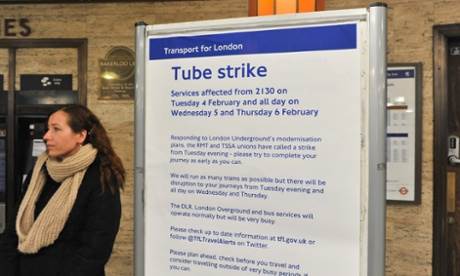
If you live or have been in London for the last two days, it will not have escaped your notice that something unusual is happening. Two trade unions who represent some London Underground staff have sparked a 48 hour strike in response to their disagreement with London Underground management over planned ticket office closures and job cuts. I am not about to get involved in the political debate between a trade union, its members and company management – I am neither a politician nor am I someone with a political opinion on the matter.
I am a huge fan of the London Underground – as a born and bred Londoner, it is unavoidable for me to have some affection for one of the most recognisable transport systems in the world. Last year I wrote a blog post about the Tube in recognition of its 150 year anniversary – http://ijgolding.com/2013/05/17/mind-the-gap-is-the-london-underground-the-greatest-ever-customer-experience-innovation/. In my post I make the case that the London Underground is one of the greatest ever customer experience innovations. It is the Tube’s ability to innovate and evolve that has ultimately led to the current industrial action, and me writing another post today.
All organisations and all industries are having to continuously adapt to the ever-changing environment. As quickly as new technology is invented, it is usurped by something even better. Some organisations have been able to adapt to change better than others. I used to work for Shop Direct Group (now known as Shop Direct), the owners of Littlewoods. In 2004, Littlewoods had over 200 high street stores. Today they do not have any. Shop Direct transformed their retail brands into modern, innovative, technology based distance shopping power houses. Along the way, the organisation reduced significantly in size. As well as store closures, contact centres disappeared, warehouses were shut, and even roles in head office re-structured. Shop Direct did what was necessary to adapt to the changing climate. If they had done nothing, they would not exist today. Woolworths, HMV, Habitat among others did not change quickly enough – they did not transform – and we all know what happened to them. You can read more about the Littlewoods re-invention here http://ijgolding.com/2013/02/04/re-invention-and-innovation-why-we-should-all-admire-littlewoods/
What Shop Direct knew and understood is that their customers had changed. The way they were interacting with them was changing – and as a result, their operating model was no longer fit for purpose. They understood what their customer journey had become, and needed to transform the operating model to better serve it. I have had similar discussions with a number of companies in different industries in the last few months. ‘Things have changed’ is the common concern – ‘we need to change quickly to keep pace’ – companies know that not doing so will put their business at risk, whilst at the same time failing to meet changing customer expectations.
Like Shop Direct, the London Underground is another classic case study of necessary business transformation. I remember when Tube trains had a driver and a guard. When new technology came in, it was not necessary to have a guard any more. It is regrettable when technology deems that a human is no longer required, but one of the inevitable costs of innovation is that it will be at the expense of human interaction. Five years ago, not as many people used Oyster Cards as today. When I used to get the Tube to school (too long ago to admit), my ‘travel card’ was a thick card that I had to obtain from a ticket office from a lovely man who would write on my name and expiry date!
Innovation has transformed the way we use the tube, and so it is absolutely right that the people who manage the network ensure that the operating model adjusts to the way we use it. I have not visited a ticket office for years – can you remember when you last did? In a world where tickets can be issued from portable machines operated by staff on over ground trains, why can the same not be done on the London Underground? Most of us ‘top up’ online anyway.
The staff on the London Underground are wonderful people. The way they keep the network running every day with smiles on their faces, and humour in their voices always brightens up my now more infrequent Tube usage. Whilst it is hard for anyone to face change, change is inevitable if we want organisations and businesses to survive. Doing nothing is not an option. As long as management treat their colleagues with respect, and guide/help/support them where change is unavoidable, then I am in support of business transformation becoming a reality.
What we must all do as customers of the worlds oldest underground train network is try to empathise with the hard-working people who will be affected by change. We must never take for granted how lucky we are to have a job that we enjoy. However, the reality is that nothing lasts forever. Change is something we must all live with. Doing nothing is not an option.



